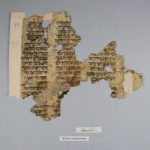Chapter 36
Necessity
“Nothing has more strength than dire necessity” – Euripides
As I read this chapter over again, I notice a sense of disquiet arising. What is that grain of sand that is bothering me? Will it turn into a Pearl of great price?
The Students working with E.J. describe an event with the teacher. E.J. is asking them to distinguish between Subjective Necessity and Objective necessity.
We all understand and have experienced subjective necessity. We are getting low on gas – our attention soars as we search for a service station. We are hungry, we begin speculating on how to eat our next meal. We are running out of breath – you get the idea.
There is the story of the young aspirant who finds a guru sitting by the river. He asks the guru if he would teach him. The guru ignores the young man. He comes back the next day. The young man poses the same question and receives the same answer. Third day he asks again. The guru gets up and leads the student into the river. He shoves his head under the water until the boy is close to drowning. He lifts him up and says “When your desire for the Work matches the desire you just had for breath, then, you will be ready.”
We intuitively sense something right about this story. We see a couple of things. We see that such a necessity is required to become more than simply human. We also sense that such a necessity for the Higher rests inside our very soul. Why can we not get to it?
We keep accessing this ‘sense of necessity’ without being able to operate from the very font of this compelling energy.
Audio Recording Class #16 2017_07_05
Chapter 37
Discovery
“Sly man is able to discover the Method because he is able to remain impartial and has no special personal need to choose some ideas and reject others… He can ‘swallow’ the Doctrine whole.” (p.88)
Only by the practice of objectivity are we able discover something. Really discover. The natural art of discovery is to discover something, yet unknown.
The Sly man also requires necessity. The Seeker must need to know something. The art of Discovery is not a passive process. The Seeker may form a Group to aide him in his quest for discovery. By forming a group he introduces many elements of uncertainty. The uncertainty is quenched by his method of Work. This form of discovery, the path of necessity, is not the same as the path of the scholar. The scholar gathers information. We are seeking knowledge and understanding.
Audio File for Class #17 2017_07_12
Chapter 38
Fragments of Methods
“We cannot trust the mind to remember our aim; only the organism can transfer habits to finer bodies. For this one must make new habits in the organic and one must also without fail have higher, finer bodies to which new habits, along the self of new format (the ‘soul’) can be transferred.”
(The) Body of resurrection must be made; consciousness alone is not sufficient.” (p.91)
In this chapter we are being introduced to the mechanics of real change. Change is not cosmetic. It is not a shifting of the furniture or a new set of clothes. Change occurs when there is a fundamental growth of something new. We will be able to identify the change.
In this chapter – this short 3 page chapter – E.J. provides us with one of the most clearly set out models for change. It is a summary of his many works. It is too simple for the human mind.
“To collect substances and transform them is more important than our state, posture, activity or consciousness. The secret of collecting substances and secret of transformation belongs to the ‘River of Initiatism’.” (p.91)
“A group is a small organization. Without organization only small personal efforts are possible.”
Audio Recording Class #18 2017_07_19
At the end of the class on 7/19/17 – we decided to create a homework assignment. That assignment was to take the last 10 paragraphs in the chapter and comment on the methods presented in any of those 10 paragraphs.
The full results of that assignment are on this page – Homework.
Here are some highlights from the submissions – (See the homework page for the full paragraph.)
Paragraph #1 –
This first paragraph was chosen for several reasons, the first of which is the experience of discouragement that every student of this method inevitably encounters.(HL)
Paragraph #2 –
When we say we need will, we see this will as a static factor, not a live muscle than can be trained and developed. (BB)
Paragraph #3 –
By repetition we are overcoming the tendency to conform with automatism, we are declaring our intention and acting upon on it. (PG)
Paragraph #4 –
The human organism and the Essential Self are diametric opposites. (GB)
Paragraph #5 –
It has become apparent to me that the Real I does not have any actions that may be considered in the human realm for such considerations as morality, popularity, beauty, success, responsibility. The real I seems to me to be above and beyond the conditions of an earthly existence with a more star like or luminous existence and be quite comfortable in other realms such as the angelic. (V)
Paragraph #6 –
After a relatively long encounter with the Work I find myself missing some ingredient that would enable me to fully immerse myself in the River of Initiatism. (DP)
Paragraph #7 –
Catalyst: “A substance that causes a chemical reaction to happen more quickly.” Also, “A person or event that quickly causes change or action.” (GB
Paragraph #8 –
Is it possible to find a catalytic effect within the realms of a working group?
Paragraph #9 –
lines of work using the mundane in a very specific way to transcend the organic (PG)
Paragraph #10 –
If there is something that remains even after death depends on what was done during the lifetime. (PG)
===========
These examples are a small sample of the work done – it was a fun exercise – take a look at the full answers at the homework page
Audio File Class #19 2017_07_26
Chapter 39
The Shifting Self
Part of our job as workers is to notice the shifting self. We notate our thought patterns as being a mere movement from one association to another. We notate emotions arising out of a scattering of responses to the vicissitudes of life. In short we notice “a series of fleeting identities which arise and just as quickly disappear.” (p. 94)
Ah, dear reader take note. The more we sense that variability in our self (selves?), the more clear that realization becomes, the more we are starting to stand in permanent I. This is a gradual process. It does take a life time of work. But this is a worthy effort.
“Discovery of a ‘permanent and sovereign I.’ That is a goal. We are fueled in our efforts by periodic touch points. Times we actually stand in that sovereign land. The sovereign of the land is the king or queen, the monarch – the supreme ruler of the land. This is a great deal to accomplish. My thoughts are that the tool for such discovery is to reveal the scorched land of our mechanical self. That is no land that you will want to live in. At the same time notice that the land of the essential self is verdant. It is filled with Wonder that transforms the dying desert into a lush living forest. In the land of Permanent ‘I’ – the voyager “has rules for himself but does not depend on them and can submit to necessity, yet remains free.” (p.95)
This is a two pronged battle. You must see the mechanicality of the desert and notate the growing forest at the same time. The proper traveler knows their strengths and weaknesses, and uses one to overcome the other.
Ordinary psychology is the study of the mechanical self. It is a process of moving the old tired furniture about. It is nothing. True “psychology should be the study of transition from sleep to self-consciousness to objective consciousness.” (p.96)
Hold the thought ‘I Am Here’ – begins the exercise revealed in this chapter. I will give the exercise here – as there are a few that do not yet have the book.
“Try this exercise: be aware of one specific body part at exactly the same hour every evening, for several weeks, despite personal pleasures and troubles; it is in this way that his exercise has power.”
We must not stop what we are doing, not deny the outer world, while at the same time remaining free in it. “(p.96)
“Man who is asleep cannot wake from death; his struggle is short, and comes too late. We struggle now, while we have strength and means; then when death comes we will not feel his sting, and at him we can inwardly laugh, but not to his face.
Death has no face, and to him we must never show disrespect. To this king everyone must bow sometime sooner or later, but a few may be able, while deeply bowing, to also quietly laugh” (p.97)
Audio Recording Class #20 2017_08_02
Chapter 40
Risk
We are working with Chapter 40 in Secret Talks Volume V – Work of Groups by E.J. Gold.
This Chapter is entitled “Risk” – In this chapter E.J. does not speak directly about RISK, but rather about the cost of change. But, consider for a moment. We are here, in this chain of communication, because we have some level of interest in Change and Transformation.
Risk is inherent in change – any change. From the most simple things. For instance, your car is running fine, but you need to change the oil. Simple enough. But, what if the oil placed within the car is not correct – what if it is foul? The car will gradually degenerate. Even the simplest of change carries an inherent risk.
Think now of changing one simple assumption about how you view the world, or more importantly, how you view your Self. I don’t know which assumption you might change – that is up to you to discover. But, basically things are going okay for the moment. You’re alive, more or less. You have a living space, enough to eat. Even a job that… okay at least it provides enough….. etc., etc.
Now change one thing in your Self – one thought pattern, one change in what you eat, one change in your daily habit, one change in your physical habit – ONE change only. It will be as a shout heard around the world. We do not know the collateral effect that such a change may have on you. That, my friends, is the risk.
There will be huge push back – huge. However, small concrete changes move mountains.
Be a mountain mover.
Audio Recording for Class # 21 2017_08_09







3 Responses to Chapters 36 – 40